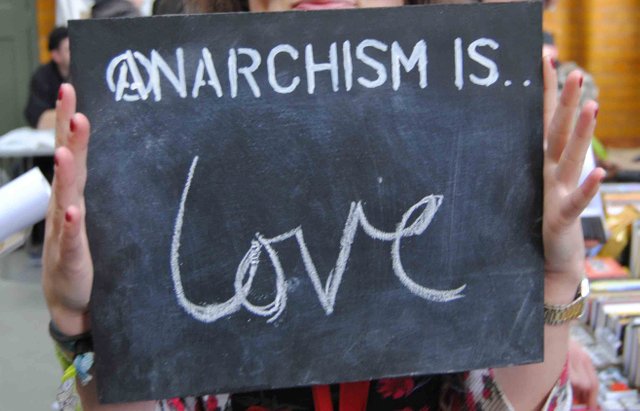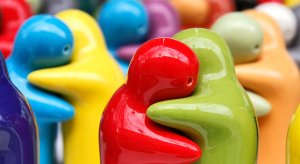How Anarchists Can Communicate more Compassionately

Communication leads to community, that is, to understanding, intimacy and mutual valuing.I want to emphasize the power of therapeutic and compassionate communication to anarchists. Both online and offline, we often rely on rhetoric lined with insults and hate instead of peaceful dialogue. Employing this language is not persuasive, but I am not suggesting that we should be perfect or that we cannot react defensively when provoked.-Rollo May, Existential Psychologist
These tendencies are natural.
But the mark of the psychologically minded anarchist is his ability to employ empathetic understanding and active listening. I know that it is difficult because we are dealing with fellow humans who are complicit in violence and tyranny, but we must try to remain steadfast and patient if we are to help them understand the beauty of individual anarchism.
Even when we maintain control and marshal arguments in an artful manner, most people's natural response is to feel judged and criticized, leading to an emotionally charged argument, characterized by both parties speaking past one another. This is where being a psychologic-anarchist shines.
If we can reign in the lizard brain (fight-or-flight mechanisms), we can make the argument more fruitful by inserting true communication rather than knee-jerk reactions. I have realized that the compassionate approach has garnered more support. Aimlessly spatting hate and nastiness, however, does not win a lot of friends.

These are a Few Compassionate Communication Tips
Here are multiple communication tips that I recommend:
0) Be conscious of the three axioms of communication:
A: One cannot not communicate
Even if a person is quiet, she is still saying something. Body language and other non-verbals are always being transferred from one person to the next. We are communicative creatures by nature, even if we do not speak a word.
B: The message sent is not always the message received
When we convey verbal or nonverbal messages, it is possible the receiver will interpret the message inaccurately. Even when we say what we intend to say, its meaning can be transmogrified. Thus, it is always important to strive for clarification, and check our own feelings about the messages we receive.
C: Nonverbal communication is always more powerful than verbal communication
Nonverbal communication can tell you a lot about somebody, even if their verbal communication does not. It can provide clues as to an individual's state of mind. If you are debating or speaking with someone in person about anarchism, always observe their body language to help determine how they feel about the debate or conversation. You will know whether to back off or continue debating.
These axioms play into the importance of all subsequent techniques.
1) Try not to blame or judge the other person. This does not mean you have to sidestep or omit truth. It is just that judging, blaming, condemning, or trying to control the person is a surefire way to thwart communication and understanding. In Choice Theory psychology, this negative communication method is referred to as external control psychology. External control psychology occurs when we pathologically try to get what we think we need out of another person, rather than helping them understand and empathize with us.
2) Show empathy by reflecting feeling and understanding. Repeat emotions and thought patterns back to people so that they know you are connected with them; try to use similar words or language so they do not misunderstand. And if you make a habit of empathizing with the other party, communication becomes a de facto interpersonal connection rather than two people battling over who is right. In counseling psychology, the empathy techniques are called basic communication skills, and they are the bare bones of compassionate interaction. Never leave home without them.
3) Actually listen. Listen deeply and intently. It will surprise you how much a person may already agree with you. Make observations based on your listening, and if you are in person, make sure you're body language says that you are there with them. Listening also proves that you are not a cult leader who is trying to recruit people into your Jim Jones world of sex orgies and Kool-Aid drinking. Active listening is indispensable.
4) Be psychologically minded: understand why you react the way you do to statements or behavior. There is often a subconscious reason why you respond to other people in hostile ways. If you can pinpoint these reasons, you can grow as a person and learn to communicate better, because you know why you become emotionally volatile. Self-growth is thus a priority in order to get in touch with other people on a fundamentally humanitarian level. See the psychological literature on self-actualization by Abraham Maslow and Carl Rogers.
5) If someone is outnumbered by anarchists in the debate, such as in a forum or social media, tell them how courageous they are for taking the time to argue with you and your friends. This is important for creating a lasting relationship, possible friendship, and allowing them the time to internalize anarchism without getting annoyed about being attacked. This is also an act of kindness and call for mutual valuing.
6) Confrontation is also important. Confrontation does not mean be aggressive toward people, though. It just means point out inconsistencies thinking process, or between emotions and thinking.
In counseling psychology, confrontation usually implies showing people discrepancies between their body language and verbal communication. In everyday debate, it means pointing out logical fallacies and errors in thinking. However, anarchists should confront in a compassionate and non-spiteful way while employing empathy and listening techniques. If done appropriately and with finesse, it will not put the other person into fight-or-flight mode and compromise the efficacy of the interaction. We do not want want scare people away from the philosophy.

You Have "Lost" if They Block You; Leveraging Neurology
Also: regardless of popular opinion, if someone blocks you on social media, it is not always because you won the argument. You likely lost if they blocked you, because that person is no longer listening or valuing what you say.
Matter of fact, they probably insulated themselves from you and your views altogether. This likely happened because you abused confrontation or acted in hateful ways. Some anarchists do this as part of their routine or desire to express machismo, but experience has told me that it is detrimental to the process.
As a side consideration: arguing with people, especially random strangers, is a stressful. It causes our brains to release cortisol, which is a hormone responsible for setting off the fight or flight response. However, high levels of this hormone can damage protein synthesis and dampen brain growth. So we never want to argue to the point of causing harm to the brain. This is more likely to occur if a person is so volatile that it leaks over into intimate relationships as well as activist confrontation.)
On the other side of the coin, if anarchists can create medium levels of arousal in themselves and the people they are arguing with, these medium levels of arousal can actually be beneficial to brain growth, and everyone involved can grow their brain connections. In other words, their frontal cortex does not get overwhelmed by cortisol, but they are still stimulated for intellectual and emotional work. For more information on this, see Louis Cozolino's book The Neuroscience of Psychotherapy: Healing the Social Brain)
Communication is a super important skill to master for anarchists. As connoisseurs of the nonviolent mentality, we are trying to use words rather than guns to change people's minds. This is important. It underpins everything that voluntaryism stands for; it underlies the idea that relationships and human interpersonal expression are the most desired traits in society. There is no reason why anarchists should reject compassionate communication. There is no reason why they should use hateful language. It is my belief talent in communication will inevitably bring more people into anarchism, and create a tipping point for a paradigm shift.
Below is an introductory video by Marshall Rosenberg, the founder of nonviolent communication. The internet is replete with information on this topic. Also feel free to contact me for more on the therapeutic aspects of compassionate communication and active listening.

I think a lot of anarchists tend to forget that they too were once "enslaved" by the propaganda of statism. A few years ago I would have scoffed at the brash, rude, overly confident and condescending way that many anarchists make their points.
This is a great article. A lot of good stuff to keep in mind. Numbers 1 and 2 especially.
It's useful if you can remember how you used to think. I was enslaved until less than a year ago, lol.
Nice. Very complementary to the piece I put out last week.
Awesome. Thanks Joe. What is your piece?
You Can't Beat Me Into Anarchy
https://steemit.com/anarchy/@anotherjoe/you-can-t-beat-me-into-anarchy
I almost feel as if I am sometimes afraid to engage the other party in a genuine fashion, as when we connect human-to-human, floodgates of emotion can open up that we are not quite sure how to deal with. Insults, etc., are a way to hide from this. There is no false pride in real connection. It renders one "naked" and vulnerable in the same way that children show emotion freely. Not that we should let our guard down completely all the time, as it does serve a purpose, but true human connection can be painful for those who have suppressed their emotive energies, and I think working with being comfortable with vulnerability and one's self are the critical point of successful anarchist to statist communication. Thanks as always, Sterlin.
The world can't have enough NVC. Thanks for spreading the good word, Sterlin.
No problem. NVC is of vital importance. And you know what, I love how you implement it in your own conversations, Luke. You are a role model.
Most of what passes for compassion these days is statist carebears who take something from one person at gunpoint, give it to another, then feel good about themselves.
Yep. I can see that. It is pseudo-compassion, but maybe we can continue to help promote authentic compassion and get them out of that mindset.
Great article. I'm a big believer in reaching out in genuine kindness and people usually appreciate
and respond in kind. However, if they react differently I feel that I have done my part and can move on with a clear conscience.
I truly believe that this approach to communicating is the only possible way anarchists will ever achieve a peaceful "revolution". Thank you, Sterlin.
100%. I think the way we communicate runs side by side with the content of our message. Both are important in terms of spreading liberty, and communication style might actually make people more willing to consider the ideas.
We want a nonviolent society, so yes, it is love.
If you love your fellow human being, you don't want to tax him and steal his money, you want to help him succeed.
I was just listening to a new podcast that goes right along these lines. And it's cleverly titled "The Argument Ninja". I'm thinking people will find it as helpful as your suggestions. You can find it here.
I am soo totally with you, and I love this article. I'll be following you.
I have two articles with similar messages myself:
https://steemit.com/anarchy/@ozertayiz/the-greatest-work-towards-achieving-anarchy-and-freedom-is-not-what-you-think
https://steemit.com/life/@ozertayiz/i-love-you-all-yes-you-separation-scarcity-fear-anger-conflict-is-not-real